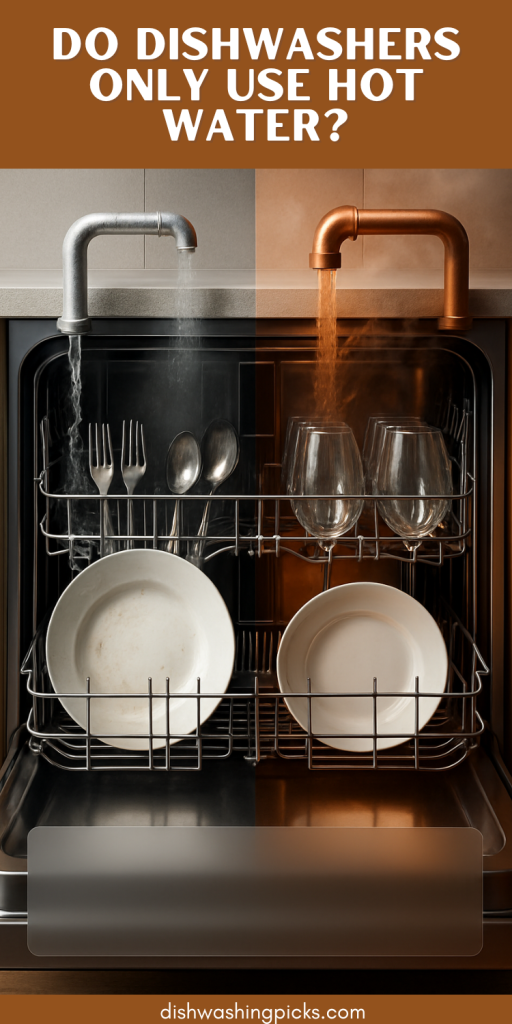
You know that satisfying hum your dishwasher makes after dinner—like it’s saying, “I got this”? But have you ever stopped to wonder what kind of water it’s actually using back there?
Is it only hot water? Can it handle cold? Does it heat water on its own or is that your home’s job?
Good questions. Let’s clear up the confusion—because what’s going on behind that door is a lot smarter (and more technical) than it seems.
Hot, Cold… or Both?
Alright, here’s the simple version:
Most dishwashers use hot water—but not always in the way you might think.
In many homes, the dishwasher connects to the hot water supply line, meaning it pulls hot water straight from your home’s water heater. This helps speed up the cycle and saves energy because the dishwasher doesn’t have to do all the heating itself.
But—and here’s where it gets interesting—dishwashers also have internal heating elements. So even if the water comes in warm or lukewarm, the machine can boost the temperature up to 120–160°F (that’s about 49–71°C) to really get your dishes sparkling and sanitized.
So no, they don’t only use hot water from the get-go—but they definitely finish with it.
What If You Hook It Up to Cold Water?
Now you’re probably wondering: What if I only have a cold water line? Can I still run the dishwasher?
Technically, yes. Many modern dishwashers can heat cold water on their own. But there’s a catch.
Here’s what might happen:
- Longer cycle times — The machine has to work harder and longer to heat the water internally.
- Higher energy use — Because now the dishwasher is doing all the heating, not your more efficient home water heater.
- Less effective cleaning (sometimes) — Some dishwashers might not heat cold water as efficiently, especially during eco or short wash cycles.
So it works… but it’s not ideal unless your dishwasher was designed with that setup in mind.
Real-Life Example: The Cold Water Dilemma
Let’s say you just moved into a new apartment, and the dishwasher is hooked up to the cold line (yep, this happens more than you’d think). At first, you don’t notice anything strange—until one day your glasses come out with spots, and the lasagna pan looks… meh.
Turns out, your machine isn’t heating the water enough to deal with greasy messes. Result? Mediocre performance and slightly embarrassing dinner parties.
Solution? If you’re stuck with cold water only, consider running the intensive cycle or investing in a dishwasher-safe rinse aid to boost results.
So Why Do Dishwashers Prefer Hot Water?
Great question. Here’s why hot water is the dishwasher’s best friend:
- Cuts through grease way better than cold
- Helps detergents dissolve properly
- Kills bacteria and germs (super important for baby bottles, cutting boards, etc.)
- Speeds up drying because hotter rinse water evaporates faster
Basically, hot water makes the whole cleaning process more effective and efficient. It’s not mandatory in every case, but it’s definitely recommended.
Do All Dishwashers Work the Same Way?
Not quite. Here’s a quick breakdown of what’s common:
- Older dishwashers: Often rely more on hot water supplied by the home and don’t heat it much themselves.
- Newer dishwashers (especially in Europe): Often connect only to cold water and do all heating internally for energy efficiency.
- Smart models or energy-saving models: Use sensors to monitor water temp and adjust accordingly.
So, before making assumptions, it’s worth checking your machine’s manual (yes, the one buried in the kitchen drawer you never open).
Final Thoughts: Should You Worry About Water Temperature?
So, back to the big question—do dishwashers only use hot water?
Not exactly.
They prefer hot water, and they need hot water to clean really well, but they’re smart enough to make it work even if you feed them cold. It’s just that efficiency might take a hit, and cycle times may stretch.
Here’s what you can do:
- If possible, connect your dishwasher to the hot water line.
- If you’re using cold, select longer or hotter cycles when needed.
- Don’t expect miracles on “eco” settings if the incoming water is freezing cold.
